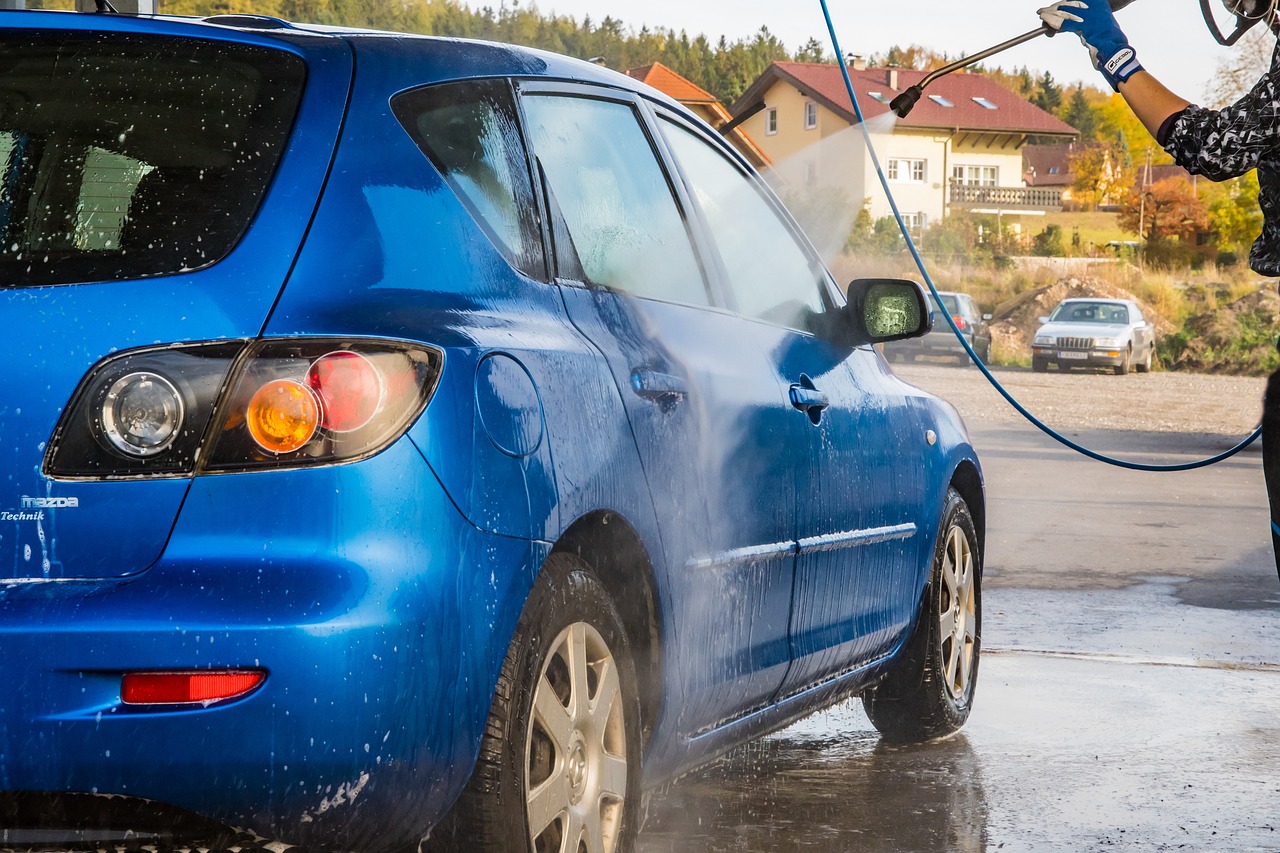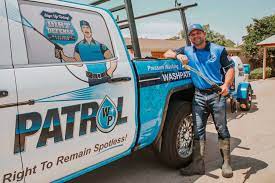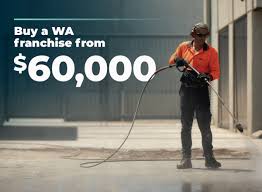Pressure Washer Franchises : 5 Lucrative Options

Welcome to our guide on Pressure Washer Franchises . If you’re considering entrepreneurship in the lucrative field of pressure washing services, franchising could be a promising avenue. In this article, we’ll explore the ins and outs of pressure washer franchises, including their benefits, market analysis, available options, costs, training, support, franchise agreements, marketing strategies, success stories, and more. Whether you’re a seasoned entrepreneur or a newcomer to the industry, this guide will provide valuable insights to help you make informed decisions in franchise ownership. Let’s dive in!
Introduction to Pressure Washer Franchises

Pressure washer franchises offer entrepreneurs an opportunity to enter the booming industry of exterior cleaning services with the support of an established brand and business model. In this section, we’ll provide an overview of pressure washer franchises, including their definition, purpose, and advantages.
1.1 Definition:
- A pressure washer franchise is a business model where individuals or investors purchase the rights to operate a pressure washing service under the brand and operational framework of a franchisor. Franchisees receive training, support, and access to proprietary systems and technologies to help them succeed in the pressure washing industry.
1.2 Purpose:
- The primary purpose of pressure washer franchises is to provide entrepreneurs with a turnkey solution for starting and operating a successful pressure washing business. Franchises offer a proven business model, brand recognition, marketing support, and ongoing training to help franchisees achieve profitability and growth in their respective markets.
1.3 Advantages:
- Pressure washer franchises offer several advantages over independent startups, including:
- Brand Recognition: Franchisees benefit from the established brand reputation and credibility of the franchisor, which can help attract customers and win contracts.
- Proven Business Model: Franchises provide a tested and proven business model, eliminating the need for franchisees to develop their own systems and processes from scratch.
- Training and Support: Franchisors offer comprehensive training programs and ongoing support to help franchisees learn the ropes of the pressure washing industry and navigate business operations effectively.
- Marketing Assistance: Franchisees receive marketing support from the franchisor, including access to marketing materials, advertising campaigns, and lead generation strategies to promote their services and attract customers.
- Purchasing Power: Franchisees benefit from the collective purchasing power of the franchise network, allowing them to access discounted pricing on equipment, supplies, and materials.
- Operational Guidance: Franchisors provide guidance and assistance with day-to-day operations, including customer service, scheduling, pricing, and quality control, helping franchisees run their businesses more efficiently.
1.4 Flexibility:
- Despite operating under a franchise system, pressure washer franchises offer flexibility in terms of ownership structure, territory size, service offerings, and growth potential. Franchisees have the opportunity to customize their business to suit their preferences and market demands while still benefiting from the support and resources provided by the franchisor.
Benefits of Investing in a Pressure Washer Franchises
Investing in a pressure washer franchise offers numerous benefits that can provide aspiring entrepreneurs with a competitive edge and a higher likelihood of success in the pressure washing industry. In this section, we’ll delve into the advantages of choosing a franchise model for starting a pressure washing business.
2.1 Established Brand Recognition:
- One of the key benefits of investing in a pressure washer franchise is the opportunity to leverage the established brand recognition of the franchisor. Established franchises have already built a reputation for quality service, reliability, and professionalism, which can significantly enhance the credibility of a new franchise location. Brand recognition can help attract customers, win contracts, and compete effectively in the local market.
2.2 Proven Business Model:
- Franchises operate based on a proven business model that has been tested and refined by the franchisor. This includes standardized operating procedures, marketing strategies, pricing models, and customer service protocols that have been proven to generate success in the pressure washing industry. By following the franchisor’s established business model, franchisees can minimize risks and increase their chances of profitability.
2.3 Training and Support:
- Franchisees receive comprehensive training and ongoing support from the franchisor to help them succeed in their pressure washing business. Training programs cover various aspects of business operations, including equipment operation, safety protocols, customer service, sales techniques, and marketing strategies. Franchisees also have access to ongoing support from the franchisor’s support team, including field support representatives who provide guidance and assistance as needed.
2.4 Marketing Assistance:
- Franchisors provide marketing assistance to help franchisees promote their pressure washing services and attract customers. This may include access to marketing materials such as brochures, flyers, and signage, as well as assistance with digital marketing efforts such as website development, social media management, and online advertising campaigns. By leveraging the franchisor’s marketing resources and expertise, franchisees can effectively reach their target audience and generate leads for their business.
2.5 Economies of Scale:
- Franchisees benefit from economies of scale by being part of a larger franchise network. This includes access to bulk purchasing discounts on equipment, supplies, and materials, as well as shared resources such as centralized call centers, administrative support, and training facilities. By leveraging the collective buying power of the franchise network, franchisees can reduce operating costs and improve profit margins.
2.6 Exclusive Territories:
- Franchisees are typically granted exclusive territories or protected territories by the franchisor, ensuring that they have a designated geographic area in which to operate their pressure washing business. Exclusive territories help prevent competition from other franchisees within the same network and provide franchisees with a defined market to target for their services. This can help franchisees build a strong customer base and establish a dominant presence in their local market.
2.7 Ongoing Research and Development:
- Franchisors invest in ongoing research and development to stay ahead of industry trends, innovations, and best practices. This includes continuously refining the franchise system, updating training materials, introducing new service offerings, and adapting marketing strategies to changing market conditions. By staying abreast of the latest developments in the industry, franchisees can remain competitive and capitalize on emerging opportunities for growth.
2.8 Peer Support and Networking:
- Franchisees have the opportunity to connect with other franchisees within the same network, providing a valuable source of peer support, advice, and networking opportunities. Franchisee networks often facilitate communication and collaboration among franchisees through online forums, regional meetings, and annual conferences. By sharing experiences, best practices, and insights with fellow franchisees, franchisees can learn from each other’s successes and challenges and enhance their own business operations.
2.9 Track Record of Success:
- Established pressure washer franchises have a track record of success and a proven history of helping franchisees achieve their business goals. By investing in a franchise with a track record of success, franchisees can benefit from the franchisor’s experience, expertise, and support infrastructure, increasing their chances of success in the pressure washing industry.
Market Analysis for Pressure Washing Services

Conducting a thorough market analysis is essential for understanding the demand, competition, and opportunities in the pressure washing industry before investing in a franchise. In this section, we’ll explore the key components of market analysis for pressure washing services.
3.1 Industry Overview:
- Begin by researching the pressure washing industry to gain a comprehensive understanding of its size, growth trends, and market dynamics. Identify the primary segments of the pressure washing market, including residential, commercial, industrial, and institutional sectors, and assess the overall demand for pressure washing services in your target market.
3.2 Market Demand:
- Analyze the demand for pressure washing services in your target geographic area by evaluating factors such as population density, economic activity, property ownership trends, and environmental conditions. Identify specific market niches or customer segments with high demand for pressure washing services, such as homeowners, property managers, commercial businesses, and government agencies.
3.3 Competitive Landscape:
- Assess the competitive landscape of the pressure washing industry in your target market by identifying existing competitors, their strengths and weaknesses, and their market share. Research local pressure washing businesses, franchises, and independent operators to understand their service offerings, pricing strategies, customer base, and brand reputation. Evaluate the level of competition in different market segments and identify opportunities to differentiate your franchise from competitors.
3.4 Market Trends and Opportunities:
- Stay informed about market trends and emerging opportunities in the pressure washing industry by monitoring industry publications, trade associations, and market research reports. Identify trends such as the growing demand for eco-friendly cleaning solutions, increased emphasis on preventive maintenance, and expansion into new service areas such as fleet washing, graffiti removal, and soft washing techniques. Look for untapped market opportunities or underserved customer needs that your franchise can capitalize on.
3.5 Regulatory Environment:
- Understand the regulatory environment governing pressure washing operations in your target market, including licensing requirements, environmental regulations, safety standards, and zoning ordinances. Ensure compliance with applicable regulations and obtain any necessary permits or certifications before launching your franchise. Familiarize yourself with industry best practices for safety, environmental stewardship, and ethical business conduct to build trust and credibility with customers and regulatory authorities.
3.6 Pricing and Profitability:
- Analyze pricing strategies and profitability benchmarks for pressure washing services in your target market. Research prevailing rates charged by competitors and determine the pricing structure for your franchise based on factors such as service complexity, equipment costs, labor expenses, overhead, and desired profit margins. Strive to strike a balance between offering competitive prices to attract customers and achieving profitability to sustain and grow your franchise business.
3.7 Customer Preferences and Expectations:
- Gain insights into customer preferences, expectations, and pain points regarding pressure washing services through market research, surveys, and customer feedback. Understand what factors influence their purchasing decisions, such as service quality, reliability, convenience, and affordability. Tailor your franchise offerings and marketing messages to address customer needs and differentiate your brand in the marketplace.
3.8 SWOT Analysis:
- Conduct a SWOT (Strengths, Weaknesses, Opportunities, Threats) analysis to assess the internal and external factors that may impact the success of your pressure washer franchise. Identify your franchise’s strengths, such as brand recognition, training support, and exclusive territories, as well as weaknesses, such as limited experience or financial resources. Identify opportunities for growth and expansion, such as entering new markets or offering specialized services, as well as potential threats, such as aggressive competition or economic downturns. Use the insights from your SWOT analysis to develop strategies for maximizing your franchise’s strengths, addressing weaknesses, capitalizing on opportunities, and mitigating threats.
Pressure Washer Franchises Options and Models Available
When considering investing in a pressure washer franchise, it’s essential to understand the various franchise options and models available. In this section, we’ll explore different types of pressure washer franchises, including single-unit franchises, multi-unit franchises, and master franchises, along with their respective characteristics and considerations.
4.1 Single-Unit Franchises:
- Single-unit franchises are the most common type of franchise arrangement, where an individual franchisee purchases the rights to operate a single pressure washing business within a defined territory. This model offers simplicity and focus, allowing franchisees to concentrate on one location and develop a strong presence in their local market. Single-unit franchises are suitable for entrepreneurs seeking a hands-on approach to business ownership and prefer to start with a smaller investment and operational scope.
4.2 Multi-Unit Franchises:
- Multi-unit franchises involve owning and operating multiple pressure washing businesses under the same franchise brand within a designated geographic area. This model allows franchisees to expand their business footprint and capitalize on economies of scale by leveraging shared resources, centralized management, and operational efficiencies across multiple locations. Multi-unit franchises are ideal for experienced entrepreneurs or investors looking to scale their business rapidly and maximize their return on investment.
4.3 Master Franchises:
- Master franchises, also known as regional or area development franchises, involve purchasing the rights to develop and sub-franchise a specific territory or region on behalf of the franchisor. Master franchisees act as intermediaries between the franchisor and individual franchisees within their territory, overseeing franchise sales, training, support, and operations. This model offers a unique opportunity for entrepreneurs to build a scalable business empire and generate revenue through franchise fees and royalties from sub-franchisees.
4.4 Conversion Franchises:
- Conversion franchises cater to existing pressure washing businesses or independent operators looking to convert their operations into a franchise format. Franchisees benefit from joining an established franchise system, gaining access to branding, marketing support, training, and operational resources while retaining the autonomy and identity of their existing business. Conversion franchises offer a streamlined pathway to franchising for entrepreneurs with existing industry experience and infrastructure.
4.5 Home-Based Franchises:
- Some pressure washer franchises offer home-based or mobile franchise options, where franchisees operate their businesses from a home office or service vehicle rather than a traditional storefront or commercial location. Home-based franchises offer flexibility, low overhead costs, and minimal startup expenses, making them attractive for entrepreneurs seeking a part-time or low-risk business opportunity. Home-based franchises are well-suited for individuals with limited capital or those looking to supplement existing income streams.
4.6 Niche Franchises:
- Niche pressure washer franchises focus on specialized segments of the pressure washing market, such as fleet washing, graffiti removal, roof cleaning, or environmental cleaning services. These franchises offer unique solutions tailored to specific customer needs and industry sectors, allowing franchisees to differentiate themselves from generalist competitors and command premium pricing. Niche franchises require specialized equipment, training, and expertise, making them suitable for entrepreneurs with a passion for niche markets and a desire to carve out a specialized niche in the industry.
4.7 Co-Branding Opportunities:
- Some pressure washer franchises offer co-branding opportunities where franchisees can combine pressure washing services with complementary services such as window cleaning, gutter cleaning, lawn care, or property maintenance. Co-branding allows franchisees to diversify their service offerings, cross-sell to existing customers, and capture additional revenue streams. Co-branding opportunities are ideal for franchisees looking to expand their business portfolio and offer comprehensive solutions to customers’ exterior cleaning needs.
4.8 Conversion Franchises:
- Conversion franchises cater to existing pressure washing businesses or independent operators looking to convert their operations into a franchise format. Franchisees benefit from joining an established franchise system, gaining access to branding, marketing support, training, and operational resources while retaining the autonomy and identity of their existing business. Conversion franchises offer a streamlined pathway to franchising for entrepreneurs with existing industry experience and infrastructure.
Pressure Washer Franchises Costs and Financial Considerations
Before investing in a pressure washer franchise, it’s essential to understand the costs involved and evaluate the financial considerations to ensure the investment aligns with your budget and financial goals. In this section, we’ll delve into the various costs associated with owning a pressure washer franchise and discuss key financial considerations for prospective franchisees.
5.1 Initial Franchise Fee:
- The initial franchise fee is the upfront payment made to the franchisor for the rights to operate a franchise under their brand. This fee typically covers the cost of franchise training, support, and initial setup, and varies depending on the franchise brand, territory size, and market demand. Initial franchise fees for pressure washer franchises can range from several thousand to tens of thousands of dollars.
5.2 Equipment and Inventory:
- Franchisees are responsible for purchasing pressure washing equipment, supplies, and inventory needed to operate their business. This includes high-pressure washers, hoses, nozzles, detergents, safety gear, and other essential tools and materials. The cost of equipment and inventory can vary depending on the size of the franchise operation, equipment specifications, and supplier pricing. Franchisees should budget for equipment purchases and ongoing replenishment of inventory to meet customer demand.
5.3 Business Setup and Operations:
- Franchisees incur expenses related to setting up and operating their pressure washing business, including business registration, insurance, licensing, permits, utilities, and administrative costs. These expenses may vary depending on factors such as geographic location, regulatory requirements, and business size. Franchisees should budget for startup costs and ongoing operational expenses to ensure smooth business operations and compliance with legal and regulatory obligations.
5.4 Marketing and Advertising:
- Franchisees are responsible for marketing and advertising their pressure washing services to attract customers and generate leads. This includes expenses related to print materials, digital marketing campaigns, website development, signage, promotional events, and advertising platforms. Franchisees may contribute to a national or regional marketing fund managed by the franchisor to support collective marketing efforts and brand building. Franchisees should allocate a portion of their budget for marketing and advertising expenses to promote their business effectively and maximize their visibility in the local market.
5.5 Royalty and Franchise Fees:
- Franchisees pay ongoing royalties and franchise fees to the franchisor as a percentage of their gross sales or a fixed monthly fee. Royalty fees compensate the franchisor for ongoing support, training, and use of the franchise system and brand, while franchise fees may cover administrative costs, technology platforms, and ongoing updates to the franchise system. The percentage or amount of royalties and franchise fees varies depending on the franchise agreement and may be subject to minimum sales thresholds or caps.
5.6 Working Capital:
- Franchisees should budget for working capital to cover day-to-day operating expenses, payroll, rent, utilities, maintenance, and unforeseen expenses. Working capital ensures that franchisees have sufficient funds to sustain their business operations during the initial startup phase and beyond, especially during seasonal fluctuations or economic downturns. Franchisees should calculate their working capital needs based on projected expenses and revenue forecasts and maintain a buffer to accommodate unexpected expenses or emergencies.
5.7 Financing Options:
- Financing options may be available to help franchisees cover the initial investment and ongoing operating expenses of their pressure washing franchise. Franchisees can explore financing options such as bank loans, Small Business Administration (SBA) loans, equipment leasing, lines of credit, or financing programs offered by the franchisor. Franchisees should research and compare financing options to find the most suitable and cost-effective solution for their franchise investment.
5.8 Return on Investment (ROI):
- Franchisees should carefully evaluate the potential return on investment (ROI) of their pressure washing franchise to assess its profitability and viability as a business venture. Consider factors such as revenue potential, profit margins, operating expenses, growth projections, and market conditions to estimate the ROI over time. Franchisees should conduct thorough financial projections and scenario analysis to understand the expected ROI and make informed decisions about investing in a pressure washing franchise.
5.9 Financial Planning and Budgeting:
- Franchisees should develop a comprehensive financial plan and budget to manage their finances effectively and ensure the long-term success of their pressure washing franchise. This includes forecasting revenue, estimating expenses, tracking cash flow, monitoring key performance indicators (KPIs), and adjusting budgets as needed to achieve financial goals. Franchisees should work closely with financial advisors, accountants, and business mentors to develop a realistic financial plan and implement sound financial management practices.
Training and Support Provided by Franchisors

Comprehensive training and ongoing support are crucial components of a successful pressure washer franchise. In this section, we’ll explore the training programs, support services, and resources provided by franchisors to help franchisees launch, operate, and grow their pressure washing businesses effectively.
6.1 Initial Training:
- Franchisors offer initial training programs to equip franchisees with the knowledge, skills, and tools needed to start their pressure washing business. Initial training typically covers topics such as equipment operation, safety protocols, cleaning techniques, customer service, sales strategies, and business management. Training may be conducted at the franchisor’s headquarters, regional training centers, or through online modules and webinars. Franchisees receive hands-on instruction from experienced trainers and have the opportunity to practice their skills in real-world scenarios.
6.2 Ongoing Support:
- Franchisors provide ongoing support to franchisees throughout the lifecycle of their pressure washing business. This includes access to a dedicated support team, field support representatives, and online resources to address questions, concerns, and operational challenges. Franchisees can rely on the franchisor for assistance with day-to-day operations, technical support, marketing guidance, and strategic planning. Ongoing support ensures that franchisees have the resources and expertise they need to overcome obstacles and succeed in their business endeavors.
6.3 Marketing and Advertising Support:
- Franchisors offer marketing and advertising support to help franchisees promote their pressure washing services and attract customers. This may include access to marketing materials such as brochures, flyers, business cards, and signage branded with the franchise logo and messaging. Franchisees may also benefit from digital marketing assistance, including website development, search engine optimization (SEO), social media management, and online advertising campaigns. Marketing support helps franchisees build brand awareness, generate leads, and grow their customer base in their local market.
6.4 Technology and Software:
- Franchisors provide technology and software solutions to streamline business operations, improve efficiency, and enhance customer service. This may include proprietary software for scheduling appointments, managing customer relationships, tracking job progress, invoicing, and reporting. Franchisees may also have access to mobile apps, GPS tracking systems, and communication platforms to facilitate communication with customers, technicians, and the franchisor’s support team. Technology and software solutions help franchisees automate routine tasks, reduce administrative burdens, and focus on delivering exceptional service to customers.
6.5 Purchasing Power and Vendor Relationships:
- Franchisees benefit from the purchasing power and vendor relationships established by the franchisor, allowing them to access discounted pricing on equipment, supplies, and materials. Franchisors negotiate bulk discounts and favorable terms with suppliers, equipment manufacturers, and service providers on behalf of the franchise network. This enables franchisees to lower their operating costs, improve profit margins, and reinvest savings into growing their business. Franchisees can leverage the franchisor’s vendor relationships to ensure timely delivery, quality products, and reliable service for their pressure washing operations.
6.6 Continuing Education and Training:
- Franchisors offer continuing education and training opportunities to help franchisees stay updated on industry trends, best practices, and new technologies. This may include advanced training courses, workshops, seminars, and conferences organized by the franchisor or industry associations. Franchisees have the opportunity to expand their skills, deepen their expertise, and pursue professional certifications to differentiate themselves in the marketplace. Continuing education and training ensure that franchisees remain competitive, adaptable, and equipped to meet evolving customer needs and industry standards.
6.7 Quality Assurance and Standards:
- Franchisors uphold quality assurance standards and best practices to maintain consistency, reliability, and customer satisfaction across the franchise network. Franchisees receive guidance and support from the franchisor to ensure compliance with quality standards, safety regulations, and ethical business practices. Franchisors may conduct periodic inspections, audits, and performance evaluations to monitor franchisee compliance and identify areas for improvement. Quality assurance measures help franchisees deliver high-quality services, build trust with customers, and protect the reputation of the franchise brand.
6.8 Peer Networking and Collaboration:
- Franchisees have the opportunity to connect with fellow franchisees within the same network to share experiences, exchange ideas, and collaborate on business initiatives. Franchisors facilitate peer networking and collaboration through regional meetings, online forums, social events, and franchisee advisory councils. Franchisees can learn from each other’s successes and challenges, seek advice and support, and foster a sense of camaraderie and community within the franchise network. Peer networking and collaboration enhance franchisee engagement, morale, and collective success.
In conclusion, investing in a pressure washer franchise offers aspiring entrepreneurs a compelling opportunity to enter the lucrative field of exterior cleaning services with the backing of an established brand, proven business model, and comprehensive support system.
Through thorough market analysis, prospective franchisees can identify viable opportunities and assess the competitive landscape to make informed investment decisions.
By understanding the various franchise options, financial considerations, and support services provided by franchisors, franchisees can embark on their entrepreneurial journey with confidence and maximize their chances of success in the pressure washing industry.
With ongoing training, marketing support, and peer networking opportunities, franchisees have the resources and expertise they need to thrive in a competitive market while delivering exceptional service to customers.
In the dynamic and growing industry of pressure washing, franchising offers a pathway to entrepreneurship that combines the benefits of independence with the support of a trusted brand and franchise network.
Frequently Asked Questions (FAQs) About Pressure Washer Franchises:
- What is a pressure washer franchise?
- A pressure washer franchise is a business model where individuals or investors purchase the rights to operate a pressure washing service under the brand and operational framework of a franchisor.
- What are the benefits of investing in a pressure washer franchise?
- Investing in a pressure washer franchise offers benefits such as established brand recognition, a proven business model, comprehensive training and support, marketing assistance, economies of scale, exclusive territories, ongoing research and development, peer networking, and a track record of success.
- What types of pressure washer franchises are available?
- Pressure washer franchises come in various models, including single-unit franchises, multi-unit franchises, master franchises, conversion franchises, home-based franchises, niche franchises, and co-branding opportunities.
- What are the costs associated with owning a pressure washer franchise?
- The costs of owning a pressure washer franchise include initial franchise fees, equipment and inventory expenses, business setup and operational costs, marketing and advertising expenses, royalty and franchise fees, working capital, and financing options.
- What kind of training and support do franchisors provide?
- Franchisors offer comprehensive training programs, ongoing support, marketing and advertising assistance, technology and software solutions, purchasing power and vendor relationships, continuing education and training, quality assurance standards, and peer networking and collaboration opportunities.
- How can I finance the purchase of a pressure washer franchise?
- Financing options for a pressure washer franchise may include bank loans, Small Business Administration (SBA) loans, equipment leasing, lines of credit, or financing programs offered by the franchisor.
- What are the key factors to consider before investing in a pressure washer franchise?
- Prospective franchisees should consider factors such as market demand, competition, franchise options, financial considerations, training and support provided by the franchisor, and their own goals, preferences, and experience.
- What steps should I take to research and evaluate pressure washer franchises?
- Research and evaluation steps include conducting market analysis, comparing franchise options, reviewing franchise disclosure documents (FDDs), speaking with current franchisees, consulting with financial advisors, and seeking legal advice.
- How can I maximize my success as a pressure washer franchisee?
- To maximize success as a pressure washer franchisee, focus on delivering high-quality services, building strong customer relationships, leveraging franchisor support and resources, staying updated on industry trends, and continuously striving for improvement and growth.
- Is owning a pressure washer franchise a good business opportunity?
- Owning a pressure washer franchise can be a rewarding business opportunity for individuals seeking entrepreneurship with the support of an established brand and franchise system. Success largely depends on factors such as market demand, effective management, and dedication to delivering excellent service to customers.



Leave a Reply
You must be logged in to post a comment.